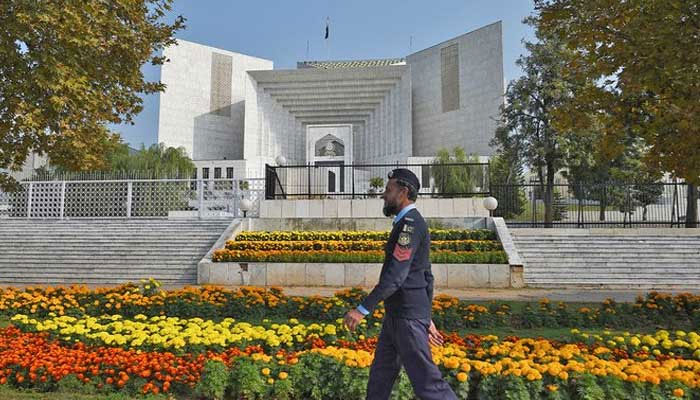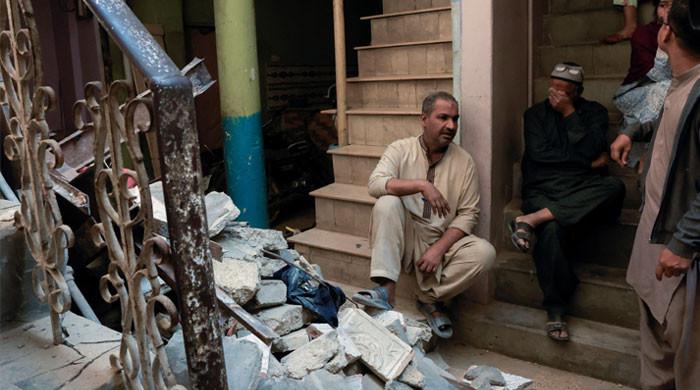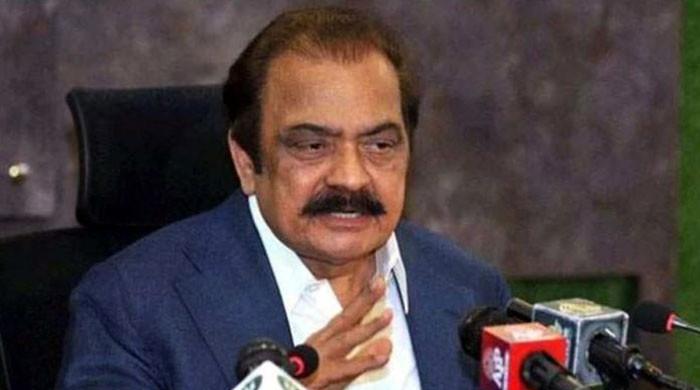Govt should consult Supreme Court before legislation concerning judiciary: CJP Bandial
Eight member bench adjourns hearing on petitions against law clipping CJP's power soon after it commenced
June 01, 2023

- CJP "happy" that govt, parliament working on amending similar laws
- Records on judicial-reforms proceedings taken from Parliament’s website.
- PML-Q requests apex court discard petitions challenging Act.
ISLAMABAD: Chief Justice of Pakistan (CJP) Umar Ata Bandial on Thursday said that the government should consult the Supreme Court regarding the legislation related to the judiciary.
The top judge’s remarks came during a hearing of the petitions challenging the constitutionality of the Supreme Court (Practice and Procedure) Act 2023, a law that aims to curtail the suo moto powers of the CJP.
An eight-member larger bench of the apex court — headed by CJP Umar Ata Bandial and comprising Justice Ijazul Ahsan, Justice Munib Akhtar, Justice Sayyed Mazahar Ali Akbar Naqvi, Justice Muhammad Ali Mazhar, Justice Ayesha A Malik, Justice Syed Hasan Azhar Rizvi and Justice Shahid Waheed — heard the petitions.
While discussing the similarities between the Supreme Court Review of Judgments and Orders Act 2023 — which relates to the right of appeal in suo motu cases — and the Supreme Court (Practice and Procedure) Act 2023, Attorney General for Pakistan (AGP) Mansoor Usman Awan had said that Parliament could look into harmonizing the two Acts.
In response to this, the CJP — while he welcomed the proposal — said that the federal government should take the top court into consideration when making any legislation related to the judiciary.
Moreover, Justice Mazhar observed: “If the laws are similar, it will be a waste of time to hear the applications related to the full court.”
When the AGP suggested that the matter be referred to Parliament, the top judge rejected the idea. Instead, he offered two alternatives — working together or working separately.
“One way is that you think about both laws and we will also consult. Otherwise, Parliament can take its own action and we will take ours. Let’s see who is faster.”
He said that if the parliament and government make suggestions, the court would consider them.
Furthermore, the issue of parliament’s refusal to provide the bench with the NA’s records of the proceedings on the judicial reforms was brought up — the request was put forward by the court on May 8.
However, the CJP seemed unperturbed by the refusal and said that the proceedings had been taken from the parliament’s website.
The hearing was then adjourned till next week.
PML-Q’s response
Ahead of the hearing today, Pakistan Muslim League-Quaid (PML-Q) submitted its response to the apex court’s notice and requested that the court discard the petitions claiming that the Act would neither increase nor decrease the independence of the judiciary.
“Section 4 of the Act broadens the jurisdiction of the Supreme Court, and Section 3 does not curtail the exercise of the Judiciary's s 184(3) power,” the response stated.
It further said that section 3 simply calls for the chief justice to exercise the power of self-notice in conjunction with senior judges.
Moreover, it submitted that the committee's use of suo motu powers to hear cases will enhance the public’s trust in the judiciary.
“Former Chief Justices Iftikhar Chaudhary, Gulzar Ahmed, Saqib Nisar used their powers proactively, and the results came in the form of Steel Mill, PKLI and Nasla Tower,” PLM-Q’s response said adding that such consequences could have been avoided by legislation such as the one under dispute.
PTI wants law nullified
Pakistan Tehreek-e-Insaf (PTI), a day earlier, had petitioned the top court to declare the Act as ultra vires to the Constitution.
The PTI, through its counsel Uzair Karamat Bhandari, filed a concise statement in the petitions challenging the Act and prayed to the apex court to strike down sections 2, 3, 4, 5, 7 and 8 of the Act.
Moreover, the party submitted that the Act is beyond Parliament’s legislative competence and is unlawful in that it impinges on the independence of the judiciary “which has time and again been recognised by this court as a fundamental feature of the Constitution”.
PTI’s petition also maintained that the Act went against the settled interpretations of various constitutional provisions by the apex court.
The controversial bill
The bill, aimed at regulating the powers of the CJP, was approved by the Parliament during a joint sitting on April 10.
The National Assembly, on April 21, notified the Supreme Court (Practice and Procedure) Bill 2023 as an act.
However, even before it became an Act, the bill was challenged in the Supreme Court, and, on April 13, the same bench hearing the case today halted its implementation, observing that the bill would not be acted upon in any manner till further order.
“The moment that the Bill receives the assent of the President or (as the case may be) it is deemed that such assent has been given, then from that very moment onwards and till further orders, the Act that comes into being shall not have, take or be given any effect nor be acted upon in any manner,” read the nine-page interim order issued on April 13.
In its order, the bench stated that the facts and circumstances presented here are extraordinary both in import and effect.











